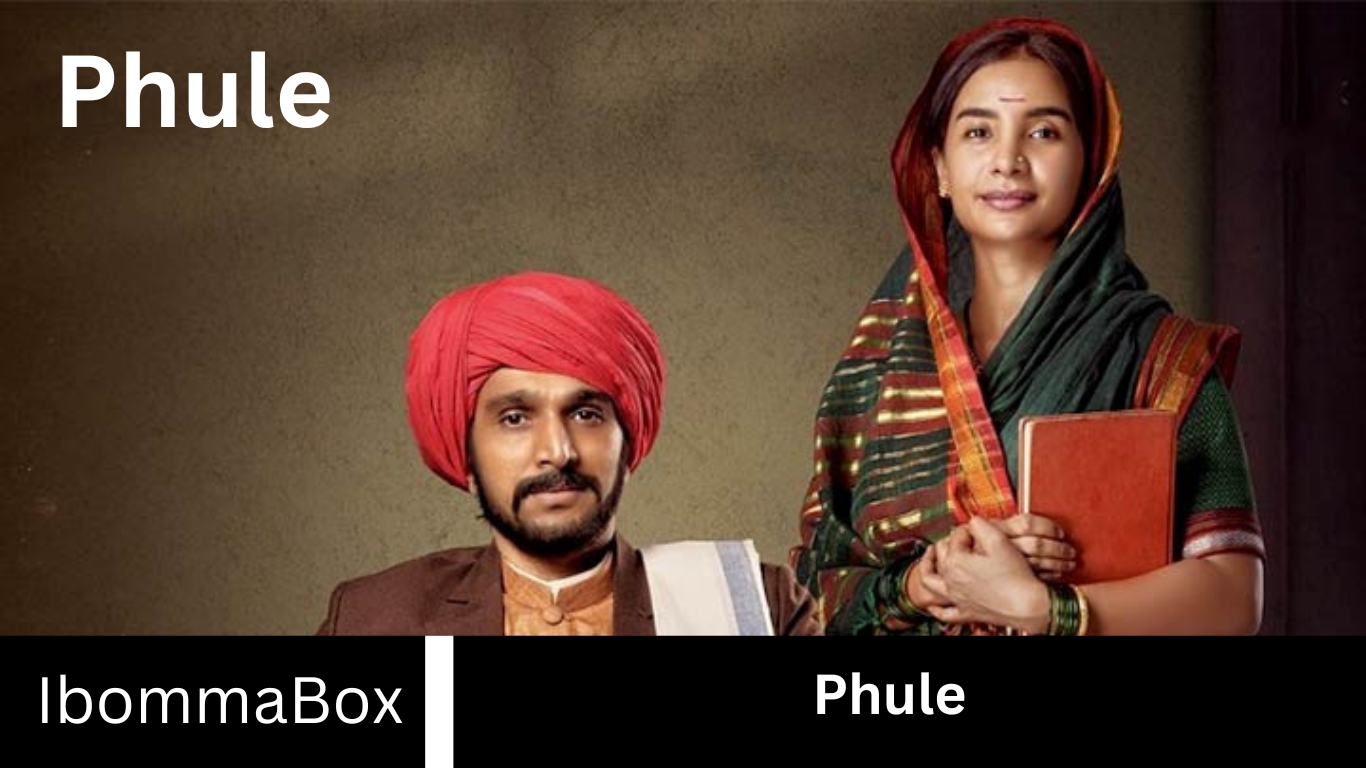“Phule” is an upcoming Hindi-language biographical drama directed by Ananth Narayan Mahadevan. It will be released on April 11, 2025. Pratik Gandhi plays Mahatma Jyotirao Phule in the film, and Patralekhaa plays his wife, Savitribai Phule. The story follows their remarkable journey as social reformers in India in the 19th century. The movie aims to shed light on their relentless struggle for equality, education, and justice for the marginalized sections of society.
The story focuses on the revolutionary efforts made by the Phules to overthrow oppressive social norms that denied women and people of lower castes access to education and rights. It highlights their groundbreaking contributions, particularly in establishing India’s first girls’ school and advocating for social justice despite facing immense opposition. The movie shows how much they gave up, how brave they were, and how committed they were to changing society forever.
Produced by Pranay Chokshi, Suunil Jaiin, Anuya Chauhan Kudecha, and Ritesh Kudecha under the banners of Dancing Shiva Productions and Kingsmen Productions, “Phule” is expected to be a powerful cinematic tribute to two of India’s greatest reformers. With its inspiring storyline and compelling performances, the film has generated significant anticipation ahead of its release.
Release Date
Phule was released on March 24, 2023, to much anticipation. The film quickly attracted attention due to its socially relevant theme centered around the life and legacy of Jyotirao Phule, a prominent social reformer from 19th-century India known for his progressive views on education, women’s rights, and the caste system.

Given the relevance of the subject matter and the growing interest in biographical dramas, the film garnered significant pre-release buzz. Upon its release, Phule resonated particularly with viewers who were eager for stories that address issues of caste, social justice, and equality.
Cast
The casting of Phule plays a crucial role in bringing the historical figures to life on screen. The film features a strong ensemble cast with skilled actors delivering memorable performances:
- Vijay Varma as Jyotirao Phule: Vijay Varma takes on the challenging role of Jyotirao Phule, the visionary social reformer and one of the earliest advocates for the education of women and the upliftment of the lower castes. Varma’s portrayal is deeply nuanced, capturing Phule’s intelligence, passion, and commitment to social justice.
- Mrunal Thakur as Savitribai Phule: Mrunal Thakur plays Savitribai Phule, Jyotirao’s wife, who was an educator and a social reformer in her own right. Her portrayal is empowering, giving voice to a woman who stood shoulder-to-shoulder with her husband in the fight against caste-based discrimination and for women’s rights.
- Pankaj Tripathi as Babuji: Pankaj Tripathi plays a character of great moral weight in the narrative. He portrays Babuji, a wise elder who guides and supports Jyotirao in his mission. Tripathi’s character adds depth and perspective to the story.
- Supporting Cast: The film also includes stellar performances from supporting cast members like Amruta Subhash, Shivraj Walvekar, and Nandita Das. Each brings essential characters to the screen who contribute to the historical context and societal struggles presented in the film.
Plot
Phule chronicles the life and contributions of Jyotirao Phule, focusing on his passionate fight against the social hierarchies entrenched in 19th-century Maharashtra. The film primarily explores his efforts in education, the abolition of caste discrimination, and the empowerment of women, which were considered revolutionary ideas at the time.
At its core, the film follows Jyotirao’s journey from a young, idealistic man to a social reformer challenging the status quo. It portrays his early struggles with the caste-based oppression and social inequality he witnessed around him. Alongside him is his wife, Savitribai, who was also an advocate for women’s education and a key ally in his work. Together, they founded the first school for girls in India and worked tirelessly to challenge the norms of their society.
The movie delves into their personal and professional lives, showing their challenges and triumphs in a society that resisted change. It explores their efforts to establish education as a fundamental right, particularly for marginalized communities, and their challenges against orthodox social structures, including the caste system.
Story
The story of Phule is rooted in a vision of social justice, equality, and the power of education. It begins with Jyotirao’s formative years when he became acutely aware of the profound social disparities in his society. As a young man, he was struck by the oppressive conditions of the lower castes and women, which sparked a desire to challenge the system.

The film then transitions to his marriage with Savitribai, who shares his vision of societal reform. Together, they embarked on a mission to fight against societal injustices, creating schools for girls and advocating for the right to education for all. The couple’s work was fraught with opposition, including threats, public shaming, and even violent protests, but their resolve never wavered.
Themes
Phule explores several significant themes that remain relevant even today. The central themes include:
- Social Justice: The film provides a powerful commentary on the caste system and the discrimination faced by the Dalit community, with Jyotirao Phule at the forefront of challenging these hierarchies. His fight against untouchability and caste oppression forms a key pillar of the narrative.
- Education as a Right: The film underscores the importance of education in uplifting marginalized communities. Jyotirao Phule’s work in setting up schools for girls and lower-caste children became a cornerstone of his social reform movement. The film highlights how education can be a transformative force.
- Women’s Empowerment: The role of women, particularly Savitribai Phule, is central to the film. Phule’s efforts to bring women into the fold of education and social reform are portrayed as revolutionary, making Phule an essential movie in terms of addressing gender equality.
- Perseverance Against Adversity: Throughout the film, the Phules’ unyielding commitment to their ideals in the face of societal rejection is a key message. Their perseverance inspires individuals who challenge oppressive systems and work toward equality.
Review
Phule has received widespread praise for its strong performances, particularly from Vijay Varma and Mrunal Thakur, whose chemistry on the screen brings the historical couple to life with emotional depth. Varma’s portrayal of Jyotirao Phule is lauded for its sensitivity and authenticity. In contrast, Thakur’s portrayal of Savitribai is both powerful and empathetic, shedding light on her vital role in the movement.

Critics have also highlighted the film’s screenplay, which successfully balances historical accuracy with cinematic storytelling. The film avoids becoming overly preachy or heavy-handed, allowing the emotional weight of the character’s journey to unfold organically.
Visually, the film has been praised for its rich cinematography, which captures the rural landscapes of Maharashtra in the late 1800s, as well as its realistic depictions of the societal challenges faced by the Phules. The film’s pacing and structure also maintain a steady rhythm, keeping viewers engaged while simultaneously giving them enough space to reflect on the more significant societal issues being addressed.
Music and Cinematography
The film’s music plays a vital role in enhancing the storytelling. It blends traditional Indian sounds with modern music that reflects the cultural and historical context of the time. The soundtrack, composed by a notable regional composer, carries the emotional weight of the narrative, elevating the scenes of struggle and triumph.
The cinematography is another strong aspect of Phule. The film’s visuals capture the essence of rural Maharashtra in the late 1800s, using broad, sweeping shots of the land and close-ups that convey the characters’ internal struggles. The art direction is meticulous, presenting a realistic portrayal of the period and offering a visual feast for the audience.
Trailer
Frequently Asked Questions
What is the release date of “Phule”?
“Phule” is set to release on April 11, 2025.
Who are the lead actors in “Phule”?
Pratik Gandhi plays Jyotirao Phule, while Patralekhaa portrays Savitribai Phule.
What is the plot of “Phule”?
The film chronicles the lives and struggles of Jyotirao and Savitribai Phule, who fight for social reform and education for marginalized communities.
Who is directing the film?
Ananth Narayan Mahadevan is the director of “Phule.”
What genre does the movie belong to?
It is a biographical drama based on real-life historical figures.
Who are the producers of “Phule”?
Pranay Chokshi, Suunil Jaiin, Anuya Chauhan Kudecha, and Ritesh Kudecha produce the film.
What themes does the movie explore?
“Phule” delves into social justice, caste discrimination, and women’s education.
Is “Phule” based on actual events?
Yes, it is inspired by the real-life contributions of Jyotirao and Savitribai Phule.
What is the significance of the Phules’ story?
Their work laid the foundation for modern education and social equality in India.
Why should audiences watch “Phule”?
The film offers an inspiring and thought-provoking depiction of India’s greatest reformers.
Conclusion
“Phule” is an inspiring biographical drama that brings to life the extraordinary journey of Jyotirao and Savitribai Phule, two of India’s most influential social reformers. The film sheds light on their relentless fight against caste-based oppression, gender discrimination, and the denial of education to the marginalized. With a powerful script, compelling performances, and historical significance, “Phule” promises to be an emotional and thought-provoking cinematic experience. The film’s portrayal of the Phules’ struggles and triumphs serves as a reminder of their invaluable contributions to social justice and education.
